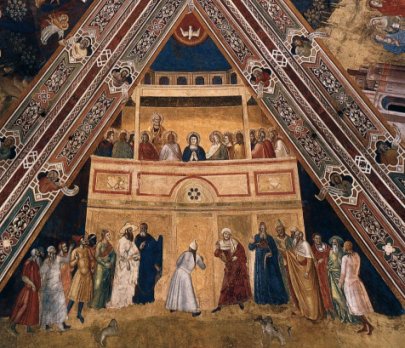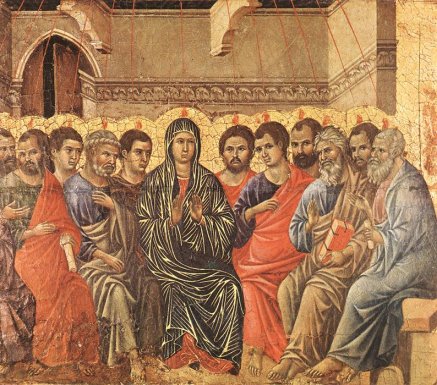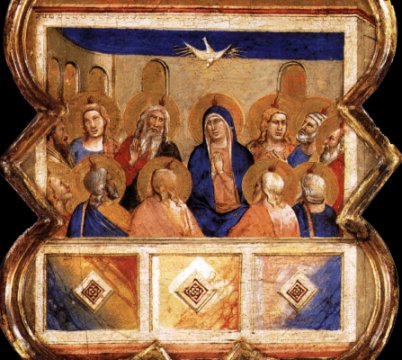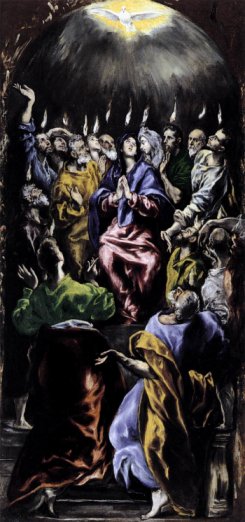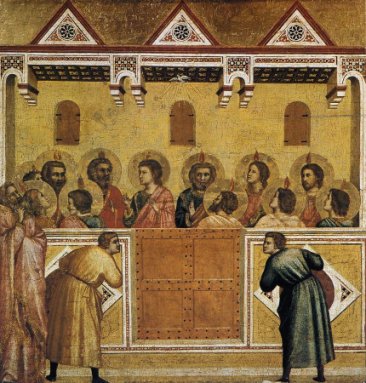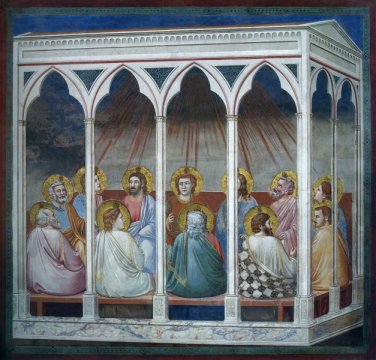|
The Passion of Christ |
|
|
Pentecost |
|
|
Better
known in the U.K. as Whitsun. The origin of the word is not entirely
clear . The most popular theory is that it is a contraction of 'White
Sunday', a traditional date for baptism when the catechumens wore white
clothes. Another idea suggests it is based on the old word for knowledge,
'wit', relating to the events at Pentecost. The word Pentecost,
which has a Greek derivation, is more straight-forward - it means 'fifty
days' and is celebrated fifty days after after Easter, though both the
first and last Sunday have to be included to make it work. It was also a
Jewish festival. The Acts of the Apostles describes the mystical event this way: And when the day of Pentecost was fully come, they were all with one accord in one place. And suddenly there came a sound from heaven as of a rushing mighty wind, and it filled all the house where they were sitting. And there appeared unto them cloven tongues like as of fire, and it sat upon each of them. And they were all filled with the Holy Ghost, and began to speak with other tongues, as the Spirit gave them utterance. And there were dwelling at Jerusalem Jews, devout men, out of every nation under heaven. Now when this was noised abroad, the multitude came together, and were confounded, because that every man heard them speak in his own language. And they were all amazed and marvelled, saying one to another, Behold, are not all these which speak Galilaeans? And how hear we every man in our own tongue, wherein we were born? Parthians, and Medes, and Elamites, and the dwellers in Mesopotamia, and in Judaea, and Cappadocia, in Pontus, and Asia, Phrygia, and Pamphylia, in Egypt, and in the parts of Libya about Cyrene, and strangers of Rome, Jews and proselytes, Cretes and Arabians, we do hear them speak in our tongues the wonderful works of God. And they were all amazed, and were in doubt, saying one to another, What meaneth this? Others mocking said, These men are full of new wine. But Peter, standing up with the eleven, lifted up his voice, and said unto them, Ye men of Judaea, and all ye that dwell at Jerusalem, be this known unto you, and hearken to my words: For these are not drunken, as ye suppose, seeing it is but the third hour of the day. (Acts Ch 1 v 1 - 16) Peter's comment can be interpreted as one of those rare humorous moments in the Bible; 'We can't be drunk! It's only the third hour of the day! |
|
| Let's look at some images. | |
|
|
|
|
|
|
|
|
|
|
|
|
|
There are one or two points in the text that cause problems for artists, and, as before, most of them come down to working out who was there. The encounter with the devout Jews presumably comes after the event: 'Now when this was noised abroad, the multitude came together, and were confounded'. The fresco by Gaddi can be seen as a two part scene, with the apostles in the upper room and the devout Jews gathering outside later on, listening to the speaking in tongues. The Virgin Mary is traditionally included in the Pentecost event, and is referred to in the previous chapter, along with 'the women and bretheren' but Acts doesn't actually say she was there on this occasion. 'they were all with one accord in one place' is ambiguous. Some artist, such as Gaddi, Duccio and el Greco, include her; other only include the disciples. But here is another problem. At the end of chapter 1 Matthias was 'numbered among the Apostles' but in chapter 2 Peter is 'standing up with the eleven.' Does this mean Peter and eleven others, or that Matthias isn't there? Most images go with the twelve, but Duccio and Gaddi have read chapter 2 carefully and include just eleven, along with the Virgin. |
|
